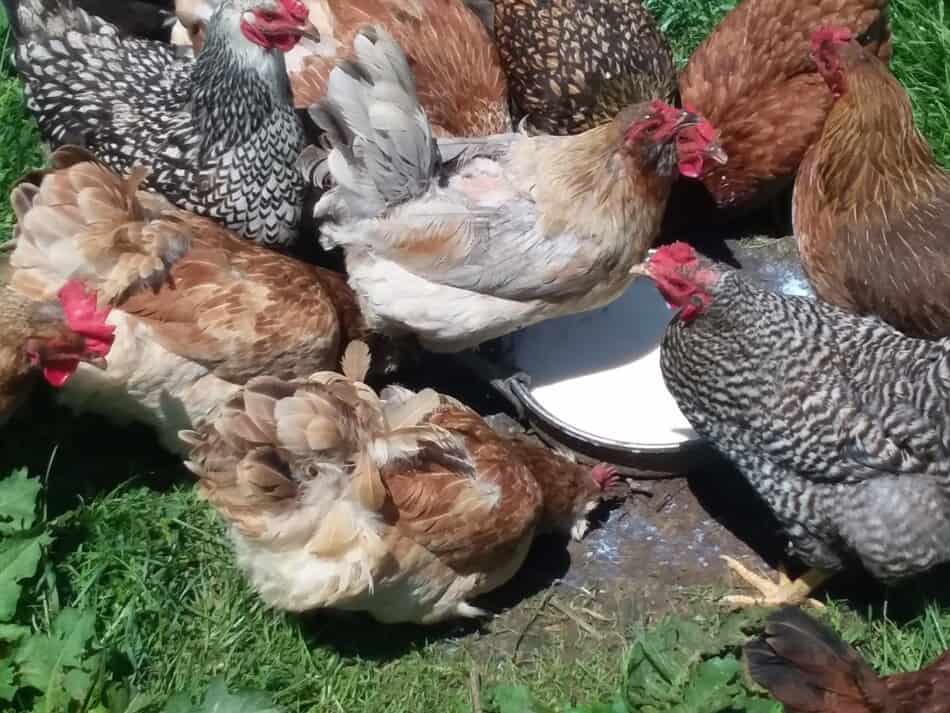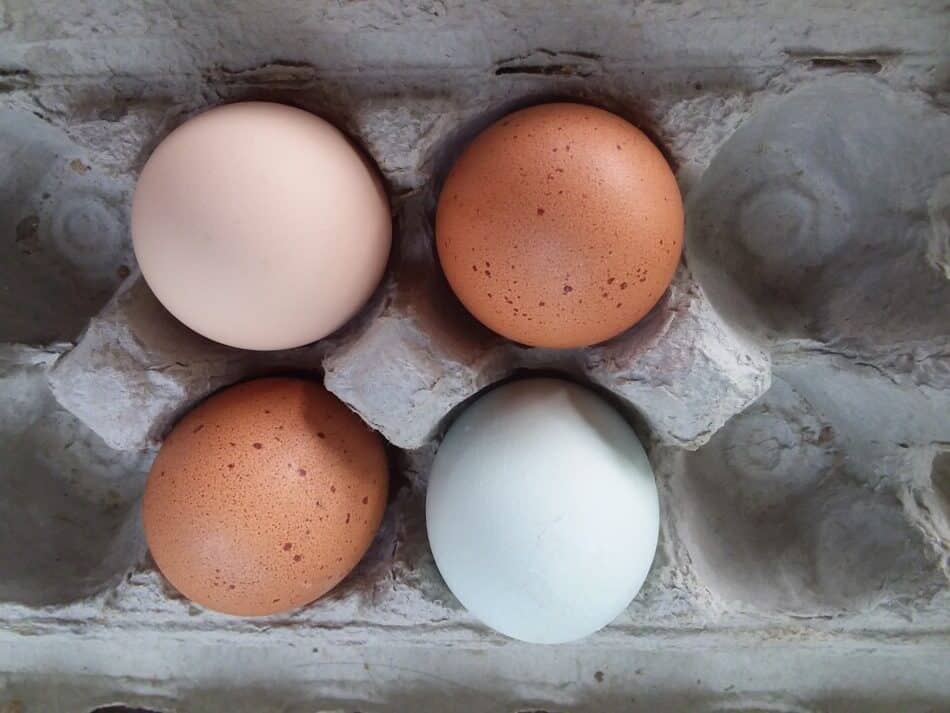Mixing Your Own Feed for Cattle Using Lowes Pellets

Tired of paying extra for name brand feed in those fancy 50 pound bags? You have some options. Have you considered making your own chicken feed?
Feed for laying chickens is made from ground corn, soybean meal, calcium carbonate and poultry mineral mix.
You can mix up your own poultry feed, we do it all of the time! As long as you can economically source the ingredients, mixing your own layer feed at home is simple.
Is Raising Hens For Eggs Worth It? gives you a cost breakdown of raising and keeping your own flock of layers.
If we have a smaller batch to make, we use a wheelbarrow to mix in. This batch size would be 100 pounds. When we need larger amounts, we use the grinder.
Note: This ration is for standard breed chickens, not broilers. Check out the broiler ration if you need are raising broilers.
Feed batch size is adjustable
The ration is listed in pounds of ingredients needed to make a ton (2,000 pound) of feed per batch. Don't let that throw you, feed rations are adjustable for batch size.
Smaller amounts are easily made by dividing down the total pounds of the ingredient needed.

For example: to make a 100 pound batch of pullet starter (the first chart listed below) you would need to take the total pounds of each ingredient listed and divide by 20 since 20 batches of 100 pounds each would total a ton.
Here's the math for the corn portion of the 100 pound batch:
1347 pounds of corn divided by 20 = 67.35 pounds of corn needed per 100 pound batch of feed.
Get the totals for the rest of the ingredients the same way.
Figure your totals before you start mixing
The only caution here is to make sure you figure up the weights ahead of time, before you start mixing. Accuracy matters.
You may find that you are mixing a batch with ingredient amounts that are too small for your scales to accurately measure. Specifically, the calcium carbonate and mineral mix amounts.
If this is the case, redo the figures with a larger batch size that you can accurately measure.
Feeding Chickens For Egg Production In Small And Backyard Flocks is a Poultry Extension article going over your feeding options.
Gather your feed ingredients
Corn: The corn will need to be ground for the young chicks to digest it.
Soybean meal: Soybeans need to be ground, whole beans are not digestible, even for the older birds.
Mineral mix: The mineral mix should be poultry specific.
Alfalfa meal 17%: The alfalfa meal is an ingredient in the alternative feed rations listed last. It is optional. If you do not want to use alfalfa meal, follow the charts listed first.
You will need a scale, containers and a wheelbarrow
Scale: You will need a scale to measure out your ingredients. A digital scale great for the mineral mix and calcium carbonate, since these two ingredients will both be in very small amounts for smaller batches.
Wheelbarrow: You will need something to mix the feed in. A wheelbarrow will hold 100 pounds and allow room for mixing.
Container: To put on scale while weighing out ingredients. We use plastic coffee cans.
5 gallon bucket: To hold the non corn ingredients before mixing with the corn.
Measure out the corn first
Here's the order you should use to make your feed.
- Measure corn
- Put corn in mixing container
- Measure all other ingredients
- Mix other ingredients in separate container
- Add other ingredients to corn
- Top mix
- Mix entire batch
Put the corn in your mixing container (the wheelbarrow or a tub of your choice), first.
Next, measure out the other ingredients (soy, calcium, mineral) and mix them together in a smaller container, like a 5 gallon bucket. I refer to this as the "soy mix" from here on.
At this point the corn is still separate from the other ingredients.
Add the soy mix (in the smaller container) to the corn. I make a dip in the top of the corn and pour the soy mix into the dip.
Stir the top of the pile together, to partially incorporate the soy mix, then mix the entire batch together.
While this may sound a bit like I'm overly picky, these steps are actually needed. By putting the corn in the wheelbarrow first, you ensure that the soy mix ingredients will be distributed through the entire batch of feed.
If you put the non corn ingredients in the wheelbarrow first, they will be much harder to completely and evenly mix together. You run the risk of ending up with pockets of mineral or calcium carbonate in the feed. Not good.
Start with the corn to ensure the best feed for your hens!
Pullet Starter for first 6 weeks
| Feed Ingredient | Amount (in pounds) |
| Percent Protein | 19.5% |
| Corn | 1347 |
| Soybean meal | 575 |
| Calcium carbonate | 8 |
| Mineral mix | 70 |
Pullet Grower for 7-15 weeks
| Feed Ingredient | Amount (in pounds) |
| Percent Protein | 15% |
| Corn | 1593 |
| Soybean meal | 340 |
| Calcium carbonate | 7 |
| Mineral mix | 60 |
Layer 1 for 16-50 weeks
| Feed Ingredient | Amount (in pounds) |
| Percent Protein | 15.5% |
| Corn | 1365 |
| Soybean meal | 410 |
| Calcium carbonate | 165 |
| Mineral mix | 60 |
Layer 2 for 51+ weeks
| Feed Ingredient | Amount (in pounds) |
| Percent Protein | 14% |
| Corn | 1435 |
| Soybean meal | 345 |
| Calcium carbonate | 170 |
| Mineral mix | 50 |
Pullet Starter with alfalfa meal for first 6 weeks
| Feed Ingredient | Amount (in pounds) |
| Percent Protein | 19.5% |
| Corn | 1302 |
| Soybean meal | 570 |
| Calcium carbonate | 8 |
| Mineral mix | 70 |
| Alfalfa meal 17% | 50 |
Pullet Grower for 7-15 weeks
| Feed Ingredient | Amount (in pounds) |
| Percent Protein | 15% |
| Corn | 1548 |
| Soybean meal | 335 |
| Calcium carbonate | 7 |
| Mineral mix | 60 |
| Alfalfa meal 17% | 50 |
Layer 1 with alfalfa meal for 16-50 weeks
| Feed Ingredient | Amount (in pounds) |
| Percent Protein | 15.5% |
| Corn | 1320 |
| Soybean meal | 405 |
| Calcium carbonate | 165 |
| Mineral mix | 60 |
| Alfalfa meal 17% | 50 |
Layer 2 with alfalfa meal for 51+ weeks
| Feed Ingredient | Amount (in pounds) |
| Percent Protein | 14% |
| Corn | 1390 |
| Soybean meal | 340 |
| Calcium carbonate | 170 |
| Mineral mix | 50 |
| Alfalfa meal 17% | 50 |
Resource: white paper of master list of poultry mixes from Mt. Hope Ag Center, Mt. Hope, Ohio
We were given a copy of this list, since we mix all manner of poultry feed here on our farm using ingredients we buy at Mt. Hope Ag Center.
craytonwitheing66.blogspot.com
Source: https://familyfarmlivestock.com/make-your-own-layer-feed-pullet-feed-included/
0 Response to "Mixing Your Own Feed for Cattle Using Lowes Pellets"
Post a Comment